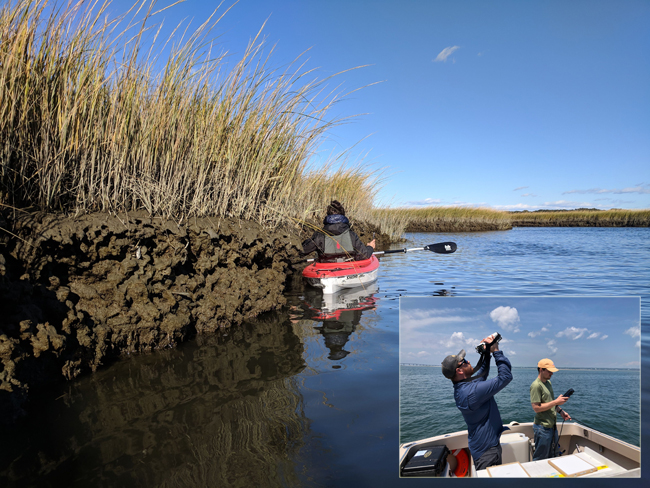
Team members of the Tzortziou lab collect measurements along Long Island Sound wetlands, near Wheeler Marsh, CT, as well as (Inset) optical measurements using sensor devices. Credit: Tzortziou Bio-Optics Lab
— By David Winzelberg for Long Island Business News
Stony Brook, NY, March 9, 2023 - Nine research projects studying Long Island Sound water quality, public beaches and marine life were awarded more than $6.3 million in funding.
The projects were awarded funding by the New York Sea Grant and Connecticut Sea Grant programs and the U.S. Environmental Protection Agency’s Long Island Sound Study Research Grant Program.
The two-year projects, which begin this spring, are supported by $4.2 million in federal funds and supplemented with matching funds of $2.1 million, according to a statement from New York Sea Grant.
Five of the nine projects will be administered by New York Sea Grant. Among those is a study to evaluate the effects of shifting conditions in the Long Island Sound due to climate change, where scientists will examine distributional changes of warm-adapted and cold-adapted species of fish.
Another project will look into equitable access to Long Island Sound waterfront and beaches through on-demand mobility and includes designing and piloting on-demand shuttles that will facilitate equitable public access to the sound’s waterfront.
One of the projects will use a survey of households to predict residential fertilizer lawn use for coastal counties and municipalities across the sound’s watershed. Another will look at the remains of mollusks buried beneath the seafloor to understand past ecological conditions in the sound and provide location-specific information about levels of nitrogen for long time periods.
“The Long Island Sound is in the center of one of the most densely populated coastlines in the country. This investment will help Long Island Sound communities combat sources of pollution that lead to closing public beaches or contaminating local fish,” Lisa Garcia, EPA Region 2 regional administrator, said in the statement. “It will also help communities improve efforts to restore wetland habitat and increase resiliency to climate change by understanding the effects of sea level rise and warming temperatures on valuable marsh habitats. This funding will advance ecological research and play a critical role in improving water quality and reducing pollution, providing lasting results for the wildlife and wetlands in the sound for years to come.”
The projects will be led by scientists and researchers from several of the region’s universities and institutions, including Stony Brook University and the New York State Department of Environmental Conservation.
“New York Sea Grant is proud to continue this long-standing partnership with Connecticut Sea Grant and the EPA Long Island Sound Study,” Becky Shuford, director of NYSG, said in the statement. “This year was the largest research competition to date resulting in the selection of nine excellent and diverse studies that will address priorities related to historical and current water quality conditions, habitat and fisheries health and restoration, and Sound access. The results will have a direct benefit to the communities, coasts, critters, and waters of the Long Island Sound Estuary.”
More Info: New York Sea Grant
New York Sea Grant (NYSG), a cooperative program of Cornell University
and the State University of New York (SUNY), is one of 34 university-based
programs under the National Oceanic and Atmospheric Administration’s
National Sea Grant College Program.
Since 1971, NYSG has represented a statewide network of integrated
research, education and extension services promoting coastal community
economic vitality, environmental sustainability and citizen awareness
and understanding about the State’s marine and Great Lakes resources.
Through NYSG’s efforts, the combined talents of university scientists
and extension specialists help develop and transfer science-based
information to many coastal user groups—businesses and industries,
federal, state and local government decision-makers and agency managers,
educators, the media and the interested public.
The program maintains Great Lakes offices at Cornell University, SUNY
Buffalo, SUNY Oswego and the Wayne County Cooperative Extension office
in Newark. In the State's marine waters, NYSG has offices at Stony Brook
University in Long Island, Brooklyn College and Cornell Cooperative
Extension in NYC and Kingston in the Hudson Valley.
For updates on Sea Grant activities: www.nyseagrant.org has RSS, Facebook, Twitter, Instagram, and YouTube links. NYSG offers a free e-list sign up via www.nyseagrant.org/nycoastlines for its flagship publication, NY Coastlines/Currents, which is published quarterly.